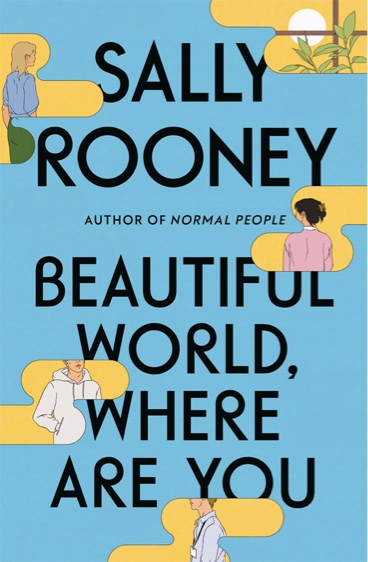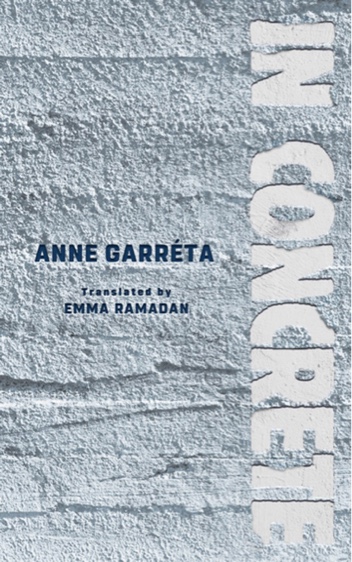-
March 9, 2022
Opening Round
-
Sally Rooney
1Beautiful World, Where Are You
v.
4In ConcreteAnne Garréta
-
Judged by
Cari Luna
To be honest, my first thought when I saw my judging assignment was, “Aw, fuck.”
I’d tried to read a Sally Rooney novel in the past, and it wasn’t for me. If you like her books, or even love her books, cool. I wouldn’t have said that you were wrong; I would have said that I am simply not her audience. These things are highly subjective and wouldn’t it be a terribly dull world if we all liked the same books, etc. Sally Rooney has been doing just fine without me among her legion of readers, and I thought she and I would happily go on like that always—me not reading her books and her not knowing I exist.
But then I (very gladly) agreed to be a judge for this year’s Tournament, and look what they gave me.
What if I didn’t like Beautiful World, Where Are You any more than I liked Conversations With Friends? Then I’d be the asshole who eliminated an internationally beloved author in the opening round. I would have an unpleasant day or three on Twitter for that, yeah? But I set aside my opinions about Rooney’s previous work and worries about what a novel about a kid stuck in concrete might be like, and dismissed the nagging thoughts about what a decision in either direction might do to my Twitter mentions. I sat down to read these two novels with a wide-open mind.
Beautiful World, Where Are You follows four 30-somethings trying to navigate life at youth’s end. Eileen and Alice are best friends. Eileen has been in love with Simon for most of her life, but apart from a tryst a decade ago in Paris, their relationship has been platonic until now. Alice, a world-famous novelist worn down by the demands of massive, unwanted fame, meets Felix on Tinder and enters into a relationship based in antagonism and mixed messages, peppered with occasional bouts of refreshingly stark honesty.
The narrative sections employ a remote omniscient perspective, but rather than having the godlike access we expect omniscience to grant, it is as if the narrator were instead watching the characters through a camera lens. The narrator, like the reader, is a spectator, describing everything they see from the outside. This distanced approach creates an admirably measured prose style; one never gets the sense that the thing has spun out of the author’s hands. That said, I did yearn for more emotional access to the characters. Also, the extreme attention to the characters’ every move can bog the pace down. (Did we need to watch Eileen unwrap a piece of gum, chew it, remove the gum from her mouth, place the chewed gum back in the wrapper, and then throw it away? No, we did not.)
The narrative sections are broken up by lengthy emails between Eileen and Alice. Through the emails, I got the level of emotional intimacy with Eileen and Alice that I craved. The novel uses the emails to dig deep into the women’s thoughts and fears, and to explore questions of politics and philosophy. I appreciated this level of access, because it allowed me to understand what drove the characters.
However, it was often difficult to tell which character was writing any given email. Many times, I had to flip back to the beginning of the section to remind myself who the speaker was, because their voices were almost identical. In the end, the emails felt like a place for the author to assert her own voice and opinions, with the characters as mere mouthpieces. I sensed Rooney’s perspective in particular when Alice considers what place novels about the everyday life of friends and lovers have in such a fucked-up world.
Alice writes:
Who can care…what happens to the novel’s protagonists, when it’s happening in the context of the increasingly fast, increasingly brutal exploitation of a majority of the human species? Do the protagonists break up or stay together? In this world, what does it matter?
And Eileen replies:
…do you think the problem of the contemporary novel is simply the problem of contemporary life? I agree it seems vulgar, decadent, even epistemically violent, to invest energy in the trivialities of sex and friendship when human civilisation is facing collapse. But at the same time, that is what I do every day.
Bright and warm, the covers of these Memo Books are heavily debossed with graphic patterns based on flowers that are among the very first to appear each spring, and then stamped with three luscious, reflective foils. The dot-graph insides are made from a superb paper from Strathmore.
Available now in 3-Packs and as part of a year-long subscription.
Beautiful World, Where Are You reads like a novel that was written from a defensive crouch. This seems to be an author who felt observed as she wrote, who anticipated an intense level of scrutiny. I could hear her arguing with the critics who live in her head. If the novel of everyday life is worthy—and I agree that it is—then just write it.
Once I got accustomed to the distanced narration, I relaxed into the novel and enjoyed myself. The story flowed smoothly and the dialogue was often excellent, a true pleasure to read. I was invested in the characters and wanted to keep reading to find out what happened to them. I hoped that things would work out well. There were moments when I was genuinely moved. I will, to that extent, call Beautiful World, Where Are You a success.
I hadn’t heard of Anne Garréta before this tournament, a gap in my reading, for sure. In Concrete is, at face value, a brief comedic novel about a hapless, DIY-obsessed father and his two children who eagerly assist him in all of his attempts at home improvement and—as the narrator would say—“muddernization,” no matter how misguided. In actuality, the book runs much deeper.
This is a work that celebrates the sheer joy of language and storytelling and the love of family, however imperfect. It’s rife with wordplay, a lot of it clever and funny, but some of it groan-inducing. The bulk of the wordplay comes in the form of puns, and they do get irritating at times. Because this is a translated work, I got the feeling, when the puns were particularly thick on the ground, that I was dealing with humor once-removed, and that I was missing something by not having direct access to the mind that conceived this book in the original French. (Though to be fair, this is a novel about a bumbling, beloved father and it is not a surprise that it’s therefore full of dad jokes. And my personal pun tolerance is relatively low.) Once you get accustomed to the overabundance of puns (which even I, pun-averse as I am, was able to do), the prose is sharp and surprising and frequently beautiful.
For example:
You don’t just ditch a machine you’ve lived with, spent hours disemboweling, repairing, insulting, a machine that’s provided you with so much filth and cleanliness, so much muddernity and anxiety. And it’s preslicely because the machine is old and sick that you can’t abandon it.
You’d suffer too much.
And you never know: it might come in handsy.
In the translator’s note, Emma Ramadan explains that much of the way that Garréta plays with language in the original text is specific to what is possible in French. English is a more brittle language, and so Ramadan had to create new games of her own rather than try to force Garréta’s linguistic inventions to make sense in a language with different sounds and rules. And so what we have here with the English edition of In Concrete is Garréta’s story infused with Ramadan’s own original wordplay and humor. Ramadan recounts how she and Garréta worked together closely on this translation via Zoom, and the result is a remarkable piece of collaborative art. That it was accomplished at a distance during successive waves of the pandemic makes it all the more impressive.
In Concrete is exuberant and joyful. It is unabashedly playful; insistently, raucously, lovingly itself. It commits from the first line and never lets up. It’s an absolute pleasure to read, all the way through. And given the significant challenges of rendering a book based in wordplay into a new language, it is a stunning feat of translation.
Because In Concrete pushes the boundaries and expectations of the novel as a form, one might expect that it’s going to be a difficult read, whereas Beautiful World, Where Are You, as a mainstream novel, is an entertainment one might expect to go down smooth and easy. But for me, In Concrete was both the more daring and the more entertaining of the two, by far.
Match Commentary
By Kevin Guilfoile & John Warner
Kevin Guilfoile (he/him): A huge upset in match one (actually the second surprise of the tourney already).
I was never as comfortable as Judge Luna with the point of view in Beautiful World, Where Are You. This third-person observer narrator tells us a great deal about how the characters look and not as much about how they feel (something Rooney tries to compensate for in the epistolary sections). Without access to their interior lives, the narrator tries to speculate about what’s going on in a character’s head. Characters “seem” to be thinking or doing things. After a time I started to ask myself, Who the hell is telling me all this? In a shorter work, I think this could have been really effective, but over the course of 300-plus pages, the author’s hand was too conspicuous for me to sustain the illusion that this world was real.
Nevertheless, Rooney is a terrific writer, and as much as Judge Luna fretted that Rooney’s books just aren’t for her, the converse of that is also true. If you like Sally Rooney novels, you will like this one, too. A lot probably. There is a kind of “sameness” to her stories in that she returns to similar kinds of characters and themes, but, to her credit, with each novel she explores those themes with a renewed intensity, and she probes her own motives and the effects of her own work within the texts of her novels in a way that I find fascinating. To quote a favorite phrase of my friend Jim Coudal, Chicago proprietor of Rooster sponsor Field Notes, “It’s great if you like that sort of thing.” And a lot of people do, myself included.
John Warner (he/him): I’m made to understand that because of my age, Sally Rooney’s novels are not necessarily meant to speak for me, but I am approaching stan levels when it comes to her work. (Note to the world: Is “stan” still a thing?) That said, I have a hard time articulating how or why I connect to Rooney’s work, but Judge Luna’s comment—“I was invested in the characters and wanted to keep reading to find out what happened to them. I hoped that things would work out well. There were moments when I was genuinely moved”—perfectly encapsulates my experience of reading the novel.
Whatever Rooney is doing, however she’s doing it, I was invested in these characters. That this happens without access to their interiors is very interesting.
Kevin: Rooney’s intent is reflected in every word of Beautiful World, Where Are You, which is an interesting contrast to In Concrete. Anne Garréta wrote an inventive and funny novel in French and then seems to have relinquished control of it to her English translator, Emma Ramadan, in a kind of trust exercise that I think most novelists would consider brave.
John: The challenges of translation when it comes to In Concrete are pretty fascinating. I mean, I know you don’t just feed a book into Google Translate and print the results, but because the process is invisible to the reader of the translation, and most of us can’t read multiple languages and compare the results, it’s tough to appreciate the choices that have to be made to capture the full spirit of what a book is trying to do. I know it’s something you’ve dealt with in your own work.
Kevin: I have a little experience with the translations of my novels, and I can tell you that some translators are much more diligent about trying to understand the text than others. Certain translators contacted me every couple of days while working on the text with a list of questions about what certain phrases meant or implied. (I remember my Chinese translator sent me into a week of contemplative introspection when he asked, about a scene set in a Chicago-area grocery store, “What does it mean to stand in line at the Jewel?”) Other translations just popped into existence without warning (“Hey, I’m getting royalties from Bulgaria now!”). In Concrete is a next-level translation. It has to be an almost complete rewrite of the original. The amount of English-specific punning going on here (“Up shit ‘crete”!) is astounding. And it’s funny!
John: I gave some of the puns the highest compliment I’m able to muster for puns—groans of recognition—but I gotta be honest, it’s not my favorite form of humor.
Kevin: I am pro-pun and proud. The pun pride flag has a yellow truck on it and we call her Gold Lorry.
John: Ugh.
Kevin: As Judge Luna suggests, when you finish reading In Concrete I highly suggest you continue on to the lengthy translator’s note at the end. If you’ve ever read a book in translation and wondered about the relationship between translator and author, it’s really fascinating. They aren’t all like that, but it is a wonderful record of a remarkable collaboration. I can imagine a reader who isn’t necessarily wild about the novel, but who is nevertheless intrigued by Ramadan’s reflections.
The New York Times recently published a story about a campaign by some translators to be more prominently featured in the English editions they worked on. According to the story, American publishers are leery of doing it because they are afraid American readers are turned off by translations. But, as the Times points out, “That might be a self-fulfilling prophecy. Since 2010, fewer than 9,000 English-language translations of fiction and poetry have been published, and in 2021, just 413 translations were released (in America).” Out of more than 500,000 adult fiction titles published last year, that is an astonishingly low number.
John: I’m calling this a pretty big upset, particularly in that Judge Luna had strong praise for Beautiful World, Where Are You. Sometimes a book will bring its A-game and still get beat. As always, I’m curious to see how the Commentariat sees things, and whether or not they think we might see a lurching, slobbering Beautiful World show up in the Zombie Round.
New 2022 Tournament of Books merch is now available at the TMN Store. As a reminder, Sustaining Members receive 50 percent off everything in our store. To find out why we’re asking for your support and how you can become a Sustaining Member, please visit our Membership page. Thank you.
Welcome to the Commentariat
Population: You
To keep our comments section as inclusive as possible for the book-loving public, please follow the guidelines below. We reserve the right to delete inappropriate or abusive comments, such as ad hominem attacks. We ban users who repeatedly post inappropriate comments.
- Criticize ideas, not people. Divisiveness can be a result of debates over things we truly care about; err on the side of being generous. Let’s talk and debate and gnash our book-chewing teeth with love and respect for the Rooster community, judges, authors, commentators, and commenters alike.
- If you’re uninterested in a line of discussion from an individual user, you can privately block them within Disqus to hide their comments (though they’ll still see your posts).
- While it’s not required, you can use the Disqus <spoiler> tag to hide book details that may spoil the reading experience for others, e.g., “<spoiler>Dumbledore dies.<spoiler>”
- We all feel passionately about fiction, but “you’re an idiot if you loved/hated this book that I hated/loved” isn't an argument—it’s just rude. Take a breath.



